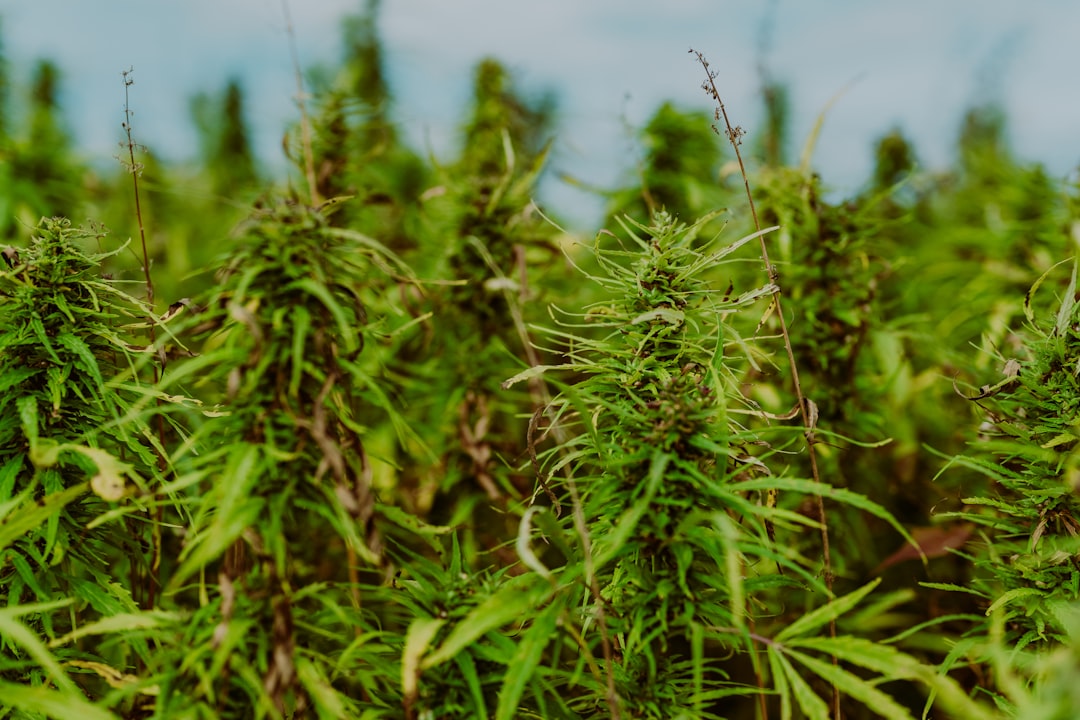
The Green Gold: Why Hemp is a Sustainable Crop
Why Sustainable Hemp Farming is Revolutionizing Agriculture
Sustainable hemp farming is revolutionizing agriculture, offering a powerful solution to environmental challenges and creating incredible economic opportunities. This versatile crop requires fewer pesticides and less water than conventional crops, captures carbon faster than most forests, and can even clean contaminated soil.
Key Benefits of Sustainable Hemp Farming:
- Water Efficiency: Requires 30% less water than cotton while producing 3x more fiber per hectare
- Carbon Champion: Sequesters 8-15 tons of CO2 per hectare - more than most forests
- Soil Health: Deep roots prevent erosion and naturally restore degraded land
- Pest Resistance: Grows with minimal pesticides due to natural disease resistance
- Versatile Uses: Every part of the plant can be used for textiles, food, construction materials, and biofuels
Hemp has been humanity's companion for over 10,000 years, and we are now refinding its potential as a cornerstone of sustainable agriculture. The global hemp market is projected to grow at 16.8% annually through 2030, driven by demand for eco-friendly alternatives.
From carbon-negative hempcrete to nutrient-rich seeds, this "green gold" offers solutions across industries. It can even remediate polluted soil, famously used to clean up contamination from the Chernobyl disaster.
As Selena Jochumsen, my work with the Hemp Committee of the National Cannabis Industry Association has shown me how sustainable hemp farming transforms communities, supports small family operations, and creates economic opportunities while protecting our planet.
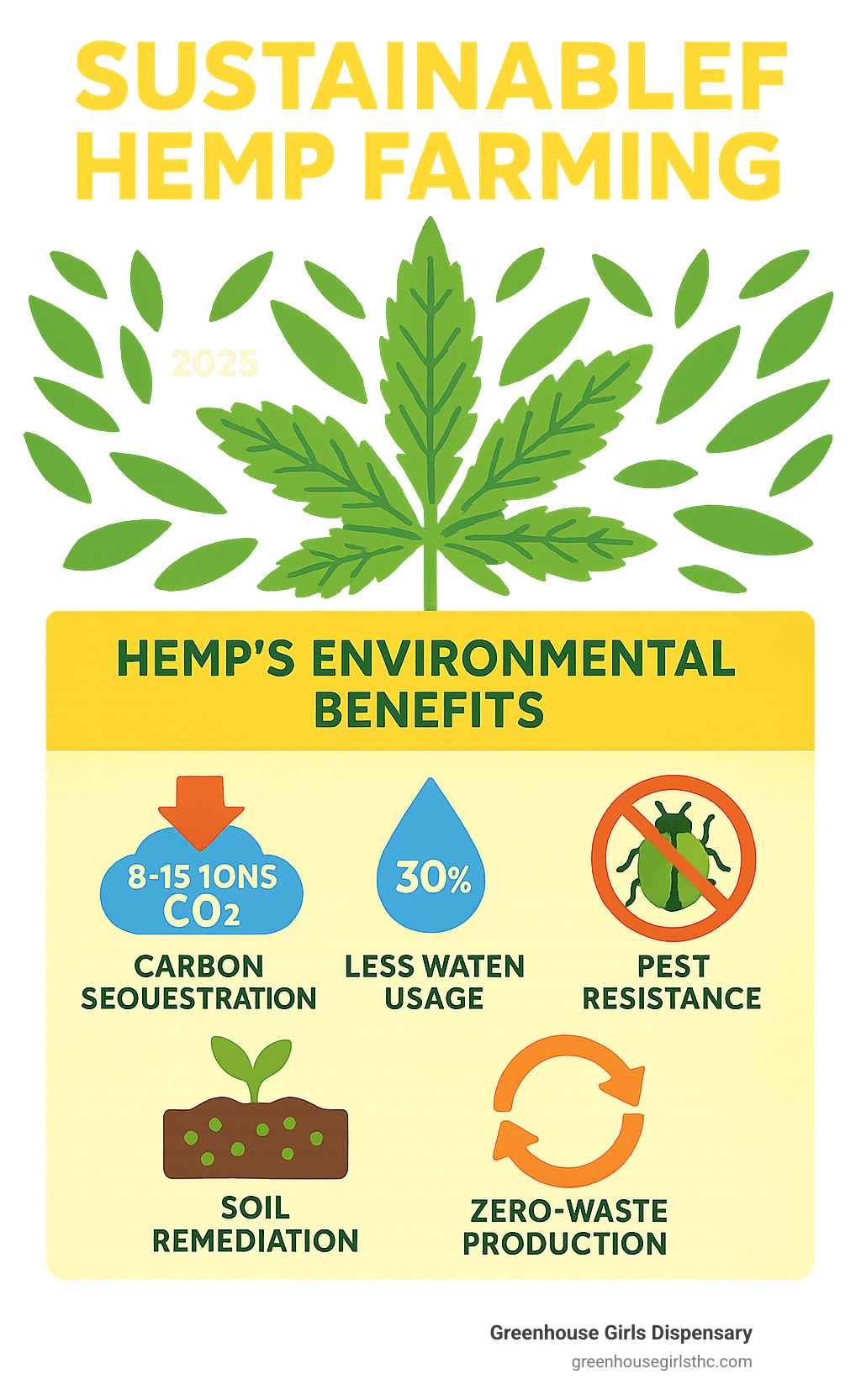
The Environmental Powerhouse: Why Hemp Beats Conventional Crops
One of our biggest environmental challenges has a simple, green solution: sustainable hemp farming. While conventional farming often harms the planet, hemp does the exact opposite.
Consider cotton: it demands 2.5 times more water than hemp for the same fiber output. Hemp, meanwhile, produces up to 3 times more fiber per hectare while using 30% less water, offering incredible efficiency.
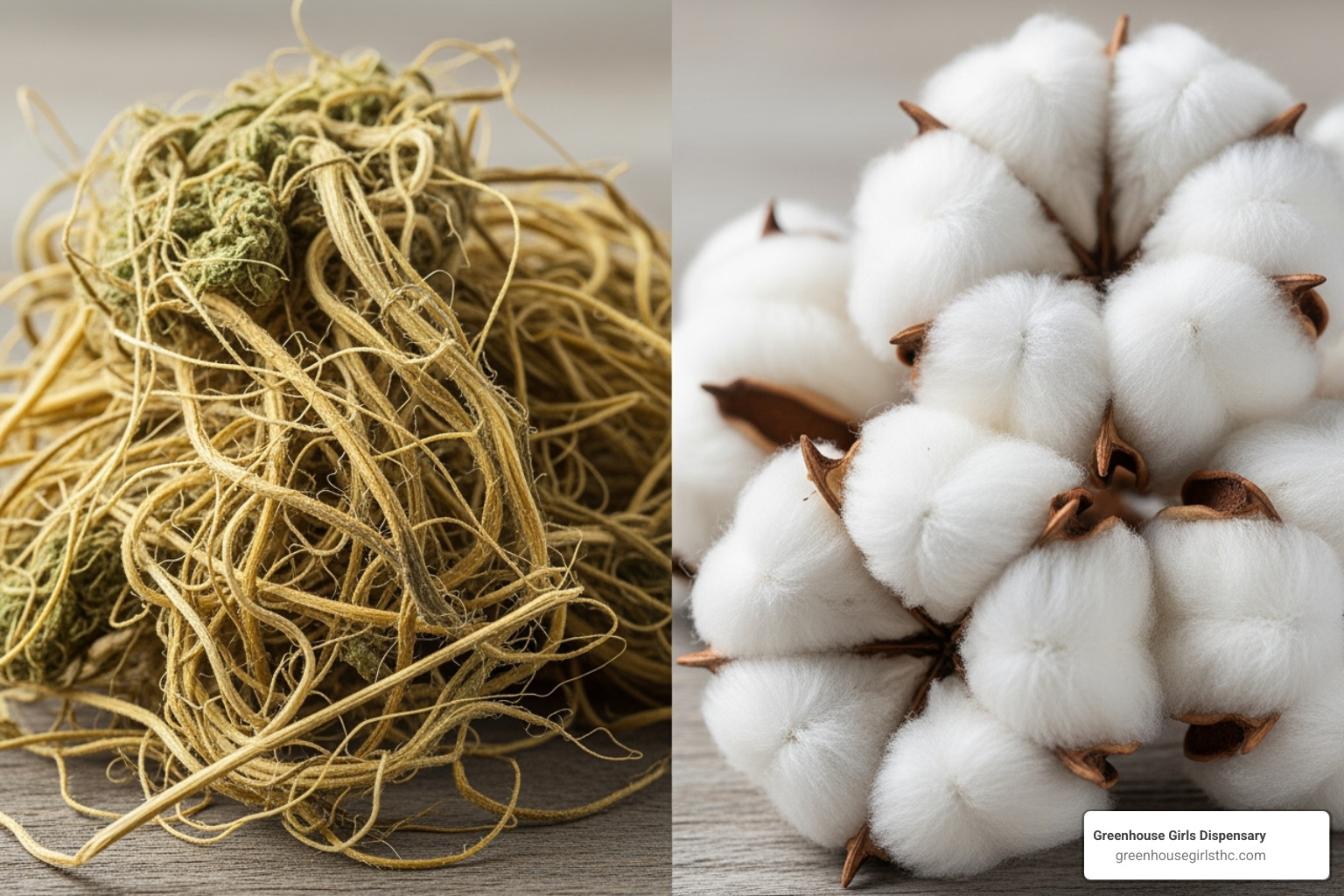
Beyond water savings, hemp is naturally pest-resistant. While cotton accounts for 11% of global pesticide use on just 2.4% of farmland, hemp thrives with minimal chemicals. This leads to cleaner water, healthier soil, and safer conditions for farm workers.
Land efficiency is another area where hemp shines. It requires only one-third of the space that cotton needs for the same fiber output, leaving more room for food crops or natural habitats.
Perhaps most importantly, hemp's natural pest resistance allows beneficial insects and pollinators to flourish, supporting biodiversity instead of destroying it.
Hemp vs. Other Natural Fibers
When comparing natural fibers, the differences are clear.
Hemp versus cotton isn't a close contest. Hemp vastly outperforms cotton, requiring less water, almost no pesticides, and one-third the land. Cotton's comfort comes at a high environmental cost.
Hemp versus bamboo is a more interesting comparison. While bamboo grows fast, turning it into soft fabric often requires harsh chemical processing that negates its environmental benefits.
Hemp's durability also sets it apart. As the strongest natural fiber, it gets softer with each wash and lasts for years, unlike cotton or bamboo fabrics.
The versatility factor is where hemp truly wins. While cotton is mainly for textiles, hemp can become textiles, building materials, food, biofuel, and bioplastics.
For those interested in the science, scientific research on the ecological benefits of hemp provides detailed analysis of its environmental advantages.
A Carbon-Negative Champion
Hemp doesn't just avoid harming the climate—it actively helps heal it.
Hemp plants are carbon-capturing machines, absorbing 8 to 15 tons of CO2 per hectare as they grow. This is comparable to mature forests but accomplished in a single growing season.
When hemp becomes hempcrete—a building material—it continues fighting climate change. The absorbed carbon stays locked inside the material, making hempcrete "carbon-negative." It removes more carbon from the atmosphere than it produces during manufacturing.
Imagine buildings that help reverse climate change. With hemp-based materials, the carbon captured during growth remains stored in the structure for its entire life.
This climate change mitigation potential makes sustainable hemp farming one of our most promising tools for reducing atmospheric CO2 while producing useful materials.
From the Ground Up: How Hemp Revitalizes Our Planet's Soil
Healthy soil is the foundation of life, but it's under threat. Sustainable hemp farming offers a powerful solution to restore our planet's soil.
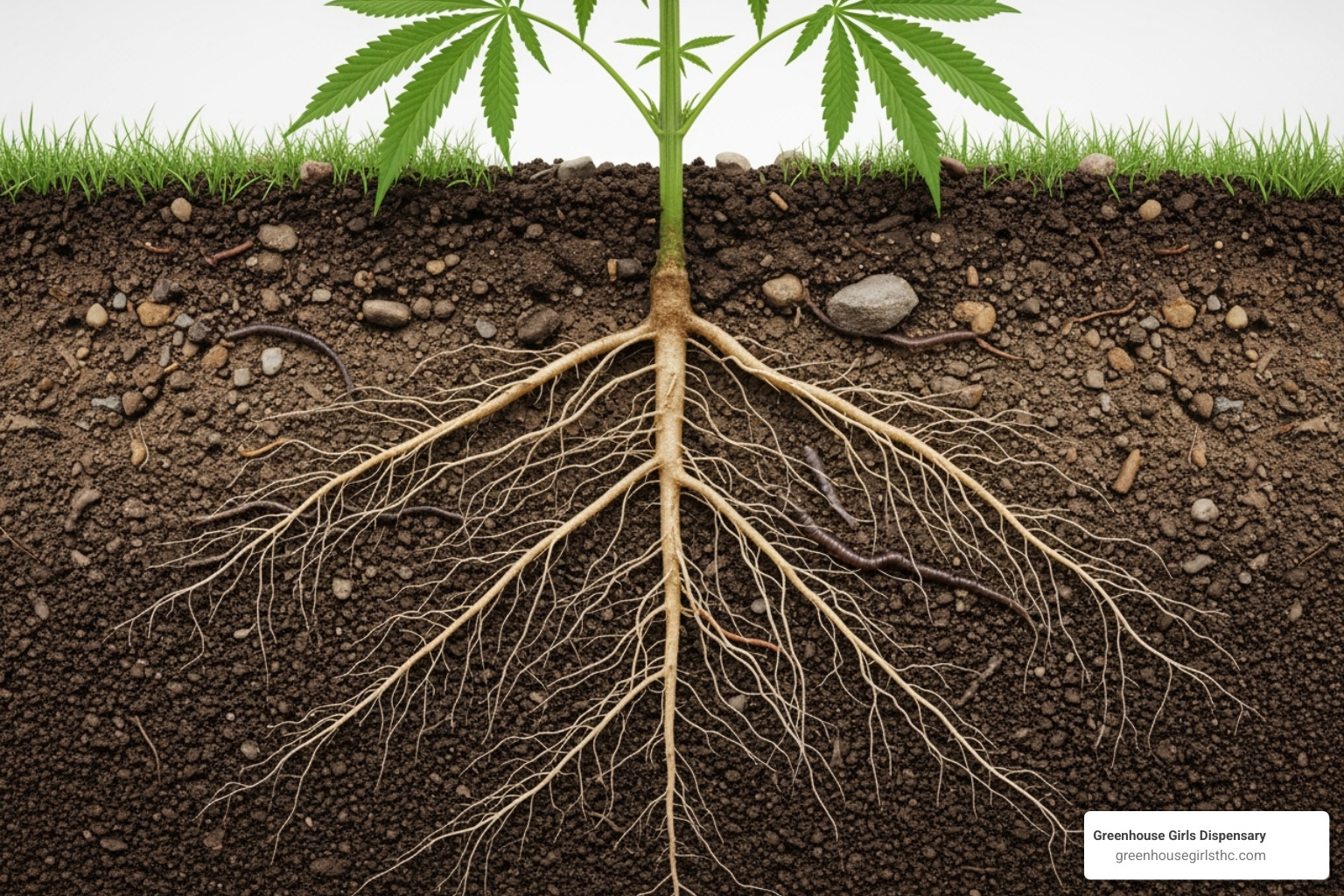
Hemp plants act as soil engineers. Their deep root systems (2-3 meters) break up compacted soil, improving aeration and water flow, which creates a healthy structure for other plants.
Hemp is also a master at phytoremediation, cleaning contaminated soil. Famously used after the Chernobyl disaster to absorb radioactive materials, it can also remove heavy metals and other pollutants from the ground.
What makes hemp even more special is its natural disease resistance. It grows strong without the harsh pesticides and fungicides that harm beneficial soil microorganisms, resulting in a thriving underground ecosystem.
The Principles of Sustainable Hemp Farming for Soil Health
Sustainable hemp farming works with nature, making soil richer over time.
Hemp's deep-rooting system brings nutrients up from deep soil layers. When the plant decomposes, these nutrients enrich the topsoil for future crops, acting as a natural, solar-powered fertilizer.
The plant also excels at carbon and nitrogen absorption, pulling these elements from the air and storing them in the soil. This builds the organic matter that makes soil fertile.
By reducing soil contamination through its natural pest resistance, hemp protects the delicate balance of soil life. This creates an improved soil structure that holds water better and drains properly.
The nutrient cycling hemp provides is impressive. As plants shed leaves, they create a natural mulch that feeds soil organisms, which release nutrients slowly over time, creating a steady supply of plant food.
What is Regenerative Hemp Farming?
Regenerative hemp farming goes beyond sustainability; it actively heals and improves damaged land.
Unlike traditional methods, regenerative farming uses practices that build new topsoil and increase biodiversity.
No-till practices are a cornerstone. Farmers plant directly into undisturbed ground, protecting the complex soil ecosystem. Hemp's strong growth makes it perfect for no-till systems.
Cover crops are also crucial, and hemp is an excellent choice. Its dense canopy protects soil from erosion while its roots build soil structure.
The holistic approach of regenerative farming considers the entire farm ecosystem, including water cycles, wildlife habitat, and long-term soil health. Hemp fits perfectly into this vision.
Building topsoil is perhaps the most exciting benefit. These practices create new fertile soil, which is incredibly valuable as we lose billions of tons of topsoil to erosion each year.
This approach to enhancing ecosystem services means the farm provides benefits beyond just crops, such as improving water quality and providing habitat for beneficial insects.
The Versatile Harvest: Hemp's Role in Sustainable Industries
What makes sustainable hemp farming so exciting is that nothing goes to waste. Every part of the plant—from fibers and core to seeds and leaves—has a purpose, supplying raw materials for dozens of industries.
This whole-plant utilization creates a circular economy. Instead of waste, hemp transforms into textiles, building materials, food, and fuel. For farmers, this means multiple revenue streams from a single crop. For the planet, it means less waste and more sustainable alternatives to petroleum-based products.
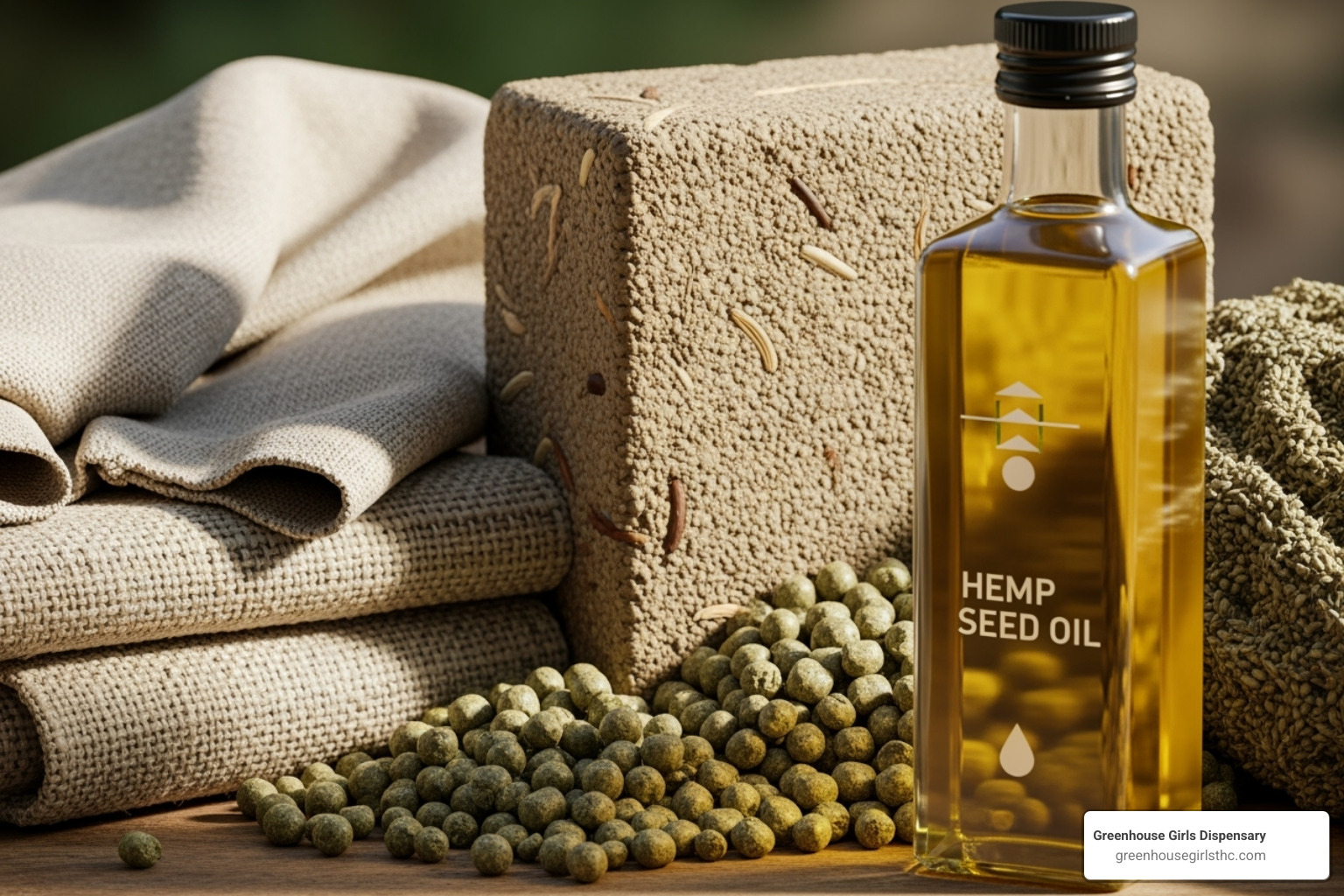
This versatility provides incredible economic viability. A single crop can supply the textile, construction, food, and energy sectors, giving farmers protection against market fluctuations.
Textiles and Fabrics
Modern hemp clothing defies old stereotypes. Today's hemp textiles are soft, breathable, and luxurious. The hemp fiber properties are impressive: these are some of the strongest natural fibers on Earth.
A key benefit of durable clothing from hemp is that it gets softer and more comfortable with each wash, unlike cotton which wears down. This creates clothing that lasts for years.
The reduced environmental footprint of hemp textiles is striking compared to conventional options. It requires a fraction of the water and pesticides cotton needs. For a sustainable wardrobe, hemp is a practical alternative to synthetic fibers that shed microplastics.
Construction and Building Materials
Hemp's role in construction is truly exciting. Hempcrete is a game-changing building material that could revolutionize the industry.
Made from hemp hurds, lime, and water, it's a lightweight construction material that provides excellent structural support.
Its insulation properties are remarkable, naturally regulating temperature and humidity to lower energy bills. It's also naturally fire resistant.
Best of all, hempcrete is a carbon-negative building material. The carbon absorbed during the plant's growth is locked into the building, turning your house into a carbon storage unit.
Bioplastics and Biofuels
Hemp offers a real solution to the plastic problem. Hemp-based bioplastics are biodegradable materials that can replace many petroleum-based plastics, breaking down naturally instead of polluting for centuries.
These alternatives are durable, reinforced with hemp fibers for use in everything from packaging to automotive parts.
Hemp biomass for fuel is another exciting frontier. The plant can be converted into biodiesel or ethanol, offering a renewable energy source that thrives on marginal land, unlike food crops.
Reducing fossil fuel dependency is crucial. While not a total replacement, hemp biofuels are part of the natural carbon cycle, offering a cleaner alternative to fossil fuels.
At Greenhouse Girls Dispensary, we see this versatility firsthand. The same plants that provide our high-quality hemp-derived products could supply materials for sustainable clothing, eco-friendly building materials, and renewable energy. This incredible versatility makes sustainable hemp farming a powerful tool for a sustainable future.
The Future of Sustainable Hemp Farming: Market, Legal, and Challenges
Hemp's story is one of redemption. A trusted crop for over 10,000 years, it became an outcast before finally reclaiming its place in modern agriculture.
For centuries, sustainable hemp farming thrived, providing materials for sails, canvas, and paper. In the 20th century, its relationship with marijuana led to a prohibition based on guilt by association, stifling decades of innovation.
Thankfully, the 2018 Farm Bill was a turning point. This landmark legislation distinguished industrial hemp (under 0.3% THC) from marijuana. By removing hemp from the Controlled Substances Act, the bill legalized hemp farming and opened the door for agricultural operations across America.
The market has responded enthusiastically. The global industrial hemp market is projected to grow at a 16.8% compound annual growth rate (CAGR) through 2030, reflecting demand for sustainable alternatives.
However, challenges remain. The biggest hurdle is the need for processing infrastructure. After decades of prohibition, the industry is rebuilding its supply chain from scratch, requiring more facilities and specialized equipment.
The regulatory landscape, while improved, still requires careful navigation, with a patchwork of state-level regulations.
Despite these growing pains, the opportunities are extraordinary. Consumer demand for sustainable products is climbing, and hemp is perfectly positioned to meet it. What excites me most is how hemp creates opportunities for small family farms, providing economic stability for rural communities while supporting sustainable hemp farming practices. For current information, visit More info about US hemp programs.
The hemp industry has also opened doors for innovative cannabinoid products. While industrial hemp has low THC, processing allows for the extraction of various cannabinoids, including federally legal Delta-8 THC, Delta-9 THC, and THCA. Understanding these compounds is key:
- What is Delta-8 THC? Why Has the Government Been Studying It Since the 1970s?
- Hemp-Derived vs. Marijuana-Derived Cannabis: What's Really the Difference?
- Why Hemp Gummies Get You High (and Why That's Legal)
- What is THCA Flower?
- Delta-8 THC vs. Delta-9 THC: Cannabinoid Effects, Gummies & More
Looking ahead, the future of hemp farming appears brighter than ever. As infrastructure develops, we can expect more innovation and market growth.
Hemp on Your Plate: A Nutritional Superstar
The same plant revolutionizing construction and textiles is also a superfood. Hemp seeds are not a mere byproduct of sustainable hemp farming; they are nutritional powerhouses for your pantry.
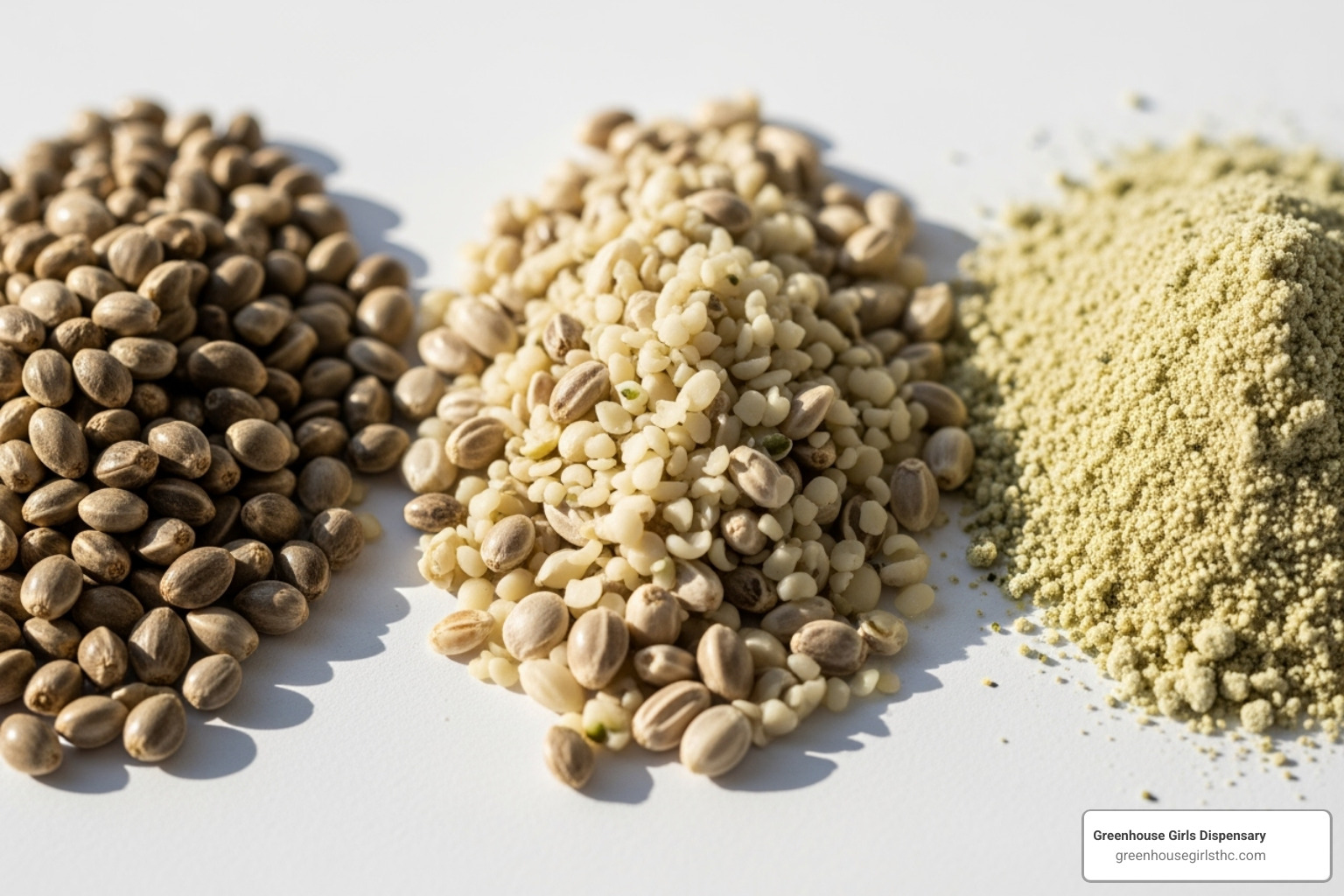
Hemp seeds and hearts are remarkable. They provide complete protein, containing all nine essential amino acids your body needs—a profile similar to meat or eggs, but from a plant.
They are also loaded with healthy omega-3 and omega-6 fatty acids in an optimal ratio. Plus, they're rich in dietary fiber, which supports digestion and helps regulate blood sugar.
These tiny gems also deliver impressive amounts of vitamin E, magnesium, phosphorus, potassium, iron, and zinc. It's like a multivitamin in a delicious, nutty-tasting seed.
Science backs this up, with a scientific review of hemp's value in food processing highlighting its potential to help feed a growing population sustainably.
The Power of Hemp Protein
Hemp protein is an excellent plant-based option that's easy to digest, unlike some other plant proteins that can cause bloating.
Its secret is its composition of edestin and albumin, two proteins your body recognizes and uses efficiently.
This digestibility makes hemp protein a game-changer in food processing. Its emulsifying properties are useful in products like salad dressings and plant-based milks.
The plant-based food industry uses hemp protein to create more satisfying meat alternatives and dairy-free products. It adds a subtle nutty flavor and improves texture.
How Consumers Can Support Sustainable Hemp Farming
As a consumer, your choices can shape the future of agriculture. Here's how you can support the hemp revolution.
Choosing sustainable brands is key. Look for companies transparent about their farming practices. At Greenhouse Girls Dispensary, we're proud to source our federally legal, lab-tested hemp-derived products from small family farms that prioritize sustainability. When you choose our THCa flower or Delta 9 gummies, you're directly supporting regenerative agriculture.
Reading labels is worth it. Look for certifications indicating organic or sustainable sourcing. Vague sourcing is a red flag.
Supporting small family farms is one of the most impactful things you can do. When you buy from brands that partner with small farms, you help preserve agricultural diversity and support rural communities.
Farmer's markets, especially in areas like Palm Harbor or Oldsmar, Florida, are great places to find local hemp products and meet the growers.
Spreading the word about hemp's benefits helps combat decades of misunderstanding. Share what you've learned with friends and family.
Every time you choose a hemp product, you're reducing your carbon footprint and voting for a more sustainable future with your wallet. The best part is that these products are often superior to their conventional alternatives.
Conclusion
Sustainable hemp farming is revolutionizing agriculture. More than just a crop, hemp is a powerful ally against climate change, capturing carbon faster than forests, healing soil, and conserving water.
Hemp's versatility is remarkable. Every part has a purpose, from fibers for textiles and seeds for food, to materials for carbon-negative hempcrete, bioplastics, and biofuel.
The market's 16.8% annual growth reflects a green revolution that is both environmentally necessary and economically viable. The 2018 Farm Bill has empowered small family farms across America to accept this sustainable crop.
At Greenhouse Girls Dispensary, we see sustainable hemp farming as our responsibility to the planet. We partner exclusively with small family farms that share our commitment to sustainable practices. When you choose our federally legal, lab-tested products like THCa flower or Delta 9 gummies, you're supporting farmers who prioritize soil health and water conservation.
From our home base in Palm Harbor and Oldsmar, Florida, we ship these sustainably sourced products nationwide. We believe every purchase is a vote for agriculture that works with nature.
The future of farming is growing in hemp fields. By choosing hemp products and supporting sustainable brands, we can all be part of the solution, investing in cleaner air, healthier soil, and a more sustainable world.

